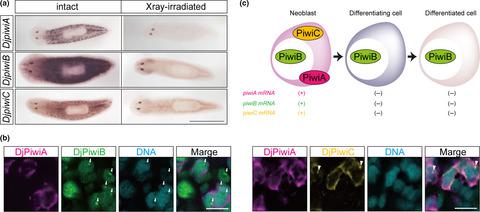当前位置:
X-MOL 学术
›
Dev. Growth Differ.
›
论文详情
Our official English website, www.x-mol.net, welcomes your
feedback! (Note: you will need to create a separate account there.)
What is the role of PIWI family proteins in adult pluripotent stem cells? Insights from asexually reproducing animals, planarians.
Development, Growth & Differentiation ( IF 1.7 ) Pub Date : 2020-07-03 , DOI: 10.1111/dgd.12688 Makoto Kashima 1 , Kiyokazu Agata 2 , Norito Shibata 3
Development, Growth & Differentiation ( IF 1.7 ) Pub Date : 2020-07-03 , DOI: 10.1111/dgd.12688 Makoto Kashima 1 , Kiyokazu Agata 2 , Norito Shibata 3
Affiliation

|
Planarians have a remarkable regenerative ability owing to their adult pluripotent stem cells (aPSCs), which are called “neoblasts.” Planarians maintain a considerable number of neoblasts throughout their adulthood to supply differentiated cells for the maintenance of tissue homeostasis and asexual reproduction (fission followed by regeneration). Thus, planarians serve as a good model to study the regulatory mechanisms of in vivo aPSCs. In asexually reproducing invertebrates, such as sponge, Hydra, and planaria, piwi family genes are the markers most commonly expressed in aPSCs. While piwi family genes are known as guardians against transposable elements in the germline cells of animals that only sexually propagate, their functions in the aPSC system have remained elusive. In this review, we introduce recent knowledge on the PIWI family proteins in the aPSC system in planarians and other organisms and discuss how PIWI family proteins contribute to the regulation of the aPSC system.
中文翻译:

PIWI家族蛋白在成人多能干细胞中起什么作用?来自无性繁殖动物,涡虫的见解。
扁平人由于其成年的多能干细胞(aPSC)(称为“成神经细胞”)而具有非凡的再生能力。扁平虫在成年后会维持大量的成胚细胞,以提供分化的细胞来维持组织的稳态和无性繁殖(裂变后再生)。因此,涡虫是研究体内aPSC调节机制的良好模型。在无性繁殖的无脊椎动物中,例如海绵,水dra和平面虫,piwi家族基因是aPSC中最常表达的标记。当piwi家族基因被公认为仅通过性繁殖的动物生殖细胞中转座因子的守护者,其在aPSC系统中的功能仍然难以捉摸。在这篇综述中,我们介绍了有关涡虫和其他生物中aPSC系统中PIWI家族蛋白的最新知识,并讨论了PIWI家族蛋白如何对aPSC系统的调节做出贡献。
更新日期:2020-08-27
中文翻译:

PIWI家族蛋白在成人多能干细胞中起什么作用?来自无性繁殖动物,涡虫的见解。
扁平人由于其成年的多能干细胞(aPSC)(称为“成神经细胞”)而具有非凡的再生能力。扁平虫在成年后会维持大量的成胚细胞,以提供分化的细胞来维持组织的稳态和无性繁殖(裂变后再生)。因此,涡虫是研究体内aPSC调节机制的良好模型。在无性繁殖的无脊椎动物中,例如海绵,水dra和平面虫,piwi家族基因是aPSC中最常表达的标记。当piwi家族基因被公认为仅通过性繁殖的动物生殖细胞中转座因子的守护者,其在aPSC系统中的功能仍然难以捉摸。在这篇综述中,我们介绍了有关涡虫和其他生物中aPSC系统中PIWI家族蛋白的最新知识,并讨论了PIWI家族蛋白如何对aPSC系统的调节做出贡献。











































 京公网安备 11010802027423号
京公网安备 11010802027423号